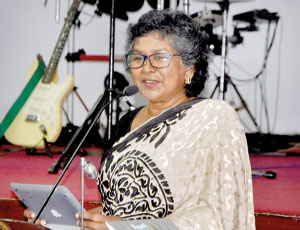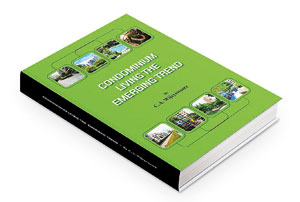Remembering sacrifices made to restore serendipity
‘Oh! Sri Lanka- smile! Your children will survive.
Heavy clouds will pass as calm seas return;
The far horizon is tinged with golden hues of hope
that breathes on the bravery of men
Changing winds fan the air and the breeze caresses
The sweating brow of a land blessed in abundance,
Ours to nurture and comfort with embraces,
Her love has no boundaries, ebb tide or nuance.’

The author addresses the gathering at the launch of her book. Pic by Nilan Maligaspe
This is the poetic introduction to Rashantha de Alwis Seneviratne’s work, Getting Serendib Back, The Difficult Journey. The book, a dedication to ‘all those who lost their lives, were maimed or injured while fighting to free us from terrorism’ chronicles the ‘most damned times of our recent past and the most ferocious’ and the labours of rising from the rubble in a bid to restore ‘serendipity’ once more.
What Rashantha fittingly calls ‘our story’ is drawn from her extensive research, her personal interviews with people, articles and ‘notes’ by some of the best read scholars and journalists. As Neville Ladduwahetty encapsulates on the back cover, the publication is ‘of diligent scholarship so movingly presented that the reader is alongside the soldier throughout, experiencing the risks and the daring of the battlefront.’ The book is also a reminder that ‘it is for us the living to make sure that the sacrifices they made were not in vain.’
“At the beginning what seemed like an exercise for myself, turned out to be a reminder of a past replete with enormous sacrifice and cost which many have already started to forget,” reflects Rashantha in a chat with the Sunday Times. Dr. Dayan Jayatilleke in his remarks at the book launch further qualified that Rashantha’s effort was “an intellectual intervention not to forget the past.”
The war against the LTTE was the longest we have struggled as a nation, notes the author. Although we have countered the uncertainties of colonial rule, two destructive insurrections and natural catastrophes such as the tsunami, the 30-year war marks the ‘most damned’ times of history, she reiterates, adding that since the British conquest it was the closest we got to ‘getting our sovereignty smashed into pieces.’
In a bid to write ‘objectively’ of this harrowing past, despite the experiences “being too real for complete detachment”, the challenges before Rashantha were formidable. It took her nearly three years to complete the book. “On one hand it was the colossal literature documented on this past which had to be navigated through and on the other the criticism leveled,” smiles the author who candidly adds, “I’m very apolitical and what matters to me is the best for my country.”
Navigating through phases of contemporary history which sowed the seeds of communal unrest that culminated in the worst bloodshed the country had ever witnessed, robbing it of its serendipity, the author in a happier note documents that the cornucopia is back in the bosom of this blessed island. However, having regained it with enormous sacrifice, ‘we should not lose it,’ she reminds urging for a collective national will bound by common grounds. “It is not a case about racist Sinhalese or racist Tamils, it is a case of getting together as Sri Lankans. We have so much meeting grounds that we are oblivious to because we don’t care to find out,” bemoans the author who reminds that reconciliation is a ‘two-way stream’ where history should be viewed as a tool to learn from, to prevent future catastrophes.
Identifying herself as a ‘nationalist for her country and what is good for her country’, Rashantha is disheartened that many extend the baggage of racism to patriotism. “I see no harm being a nationalist because it has nothing to do with racism. The late Lakshman Kadirgamar for instance, was a nationalist who did not agree with the LTTE. And that didn’t make him a lesser Tamil. He was also respected so much by the Sinhalese.”
Rashantha also warns of battles ‘outside the battlefield’ which need to be countered. “We as a nation should realize what is best for our country, even if it may displease the international community. We may be a tiny island but we need to remind the big nations that our sovereignty can never be compromised,” notes the forthright author who goes on to remark that as a nation we have always paddled our own canoe despite the rough waters now and then.
This is her “second serious outing with a pen” – the first being Sigirya Saga. The vivacious lady who dons the hats of attorney, social worker, writer and poet, does not fail in her good sense of humour either! “Sigiriya is my favourite place and I’m convinced that I was certainly not one of Kashyapa’s concubines but his chief queen or Kashyapa himself!’ she chuckles. She is presently working on another book — ‘Saradiel’, the poor man’s hero.
Rashantha applauds her ‘own heroes’- her soul mate- husband Dr.Sarath de Alwis Seneviratne and son Sacha, for putting up with her ‘erratic hours’! She also remembers her domestic staff who kept vigil till the wee hours and countless friends, scholars and colleagues who supported her to make her ambitious work a reality.
A Stamford Lake publication, Getting Serendib Back, The Difficult Journey is a chronicle of sacrifice, loyalty and patriotism stamped by both military and political innovation. It’s a fitting personification of Mark Twain’s poignant words the author had chosen as the prologue: “Patriotism is supporting your country all the time and your government, when it deserves it.”In Rashantha’s own words, “whichever way our history has gone and whatever the future will be, I like to think that what we have right now is Serendib – a land of many communities and cultures, religions and philosophies who share a mosaic of common things that I would like to think bind us, rather than divide; a place of ‘good fortune’, ‘luck’ and ‘happy chance’, if we want it.”


